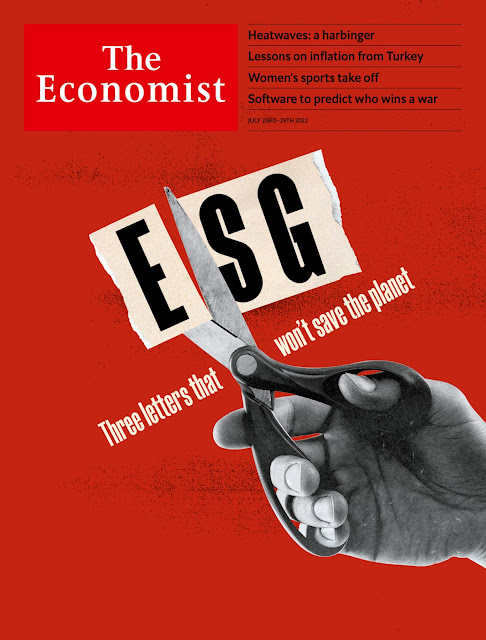The Economist Article on Environmental, Social, and Corporate Governance (ESG) Jonathan Rosen, Impact Investing Intern, American University
Recently, The Economist Magazine published an article arguing that the effort to increase the Environmental, Social, and Corporate Governance (ESG) performance of corporations and businesses is deeply flawed. The article suggested many reasons ESG is not effective and proposed an alternative they believed would better serve the purpose of improving the environment. However, when analyzing the methods promoted by The Economist, a more effective approach to dealing with these issues is not presented.
The first
point that the article makes in arguing against the effort is that ESG is too confusing. The author believes there are too many ESG objectives and that the multiplicity of commercial, business and social goals makes it difficult for firms to know what to do. The article
states that ESG provides “no coherent guide” to the trade-offs that businesses must make to comply with these new standards. However, this view is
misguided. The fact that ESG standards may be confusing does not discredit the entire effort. Additionally, trade-offs in other avenues of business
have nothing to do with ESG. The author mentioned the closing of coal mines
potentially leading to a loss of workers and suppliers as a strike against ESG. This is also misguided. Businesses always have to balance different regulations and requirements. There is no reason that managing ESG risks should be any different.
The
second point in the article is that ESG incentives are unclear, but this very sentence is contradictory. The author clearly states that one incentive is the profit business will
make when they are environmentally and socially friendly. The author also
mentions a loophole that allows businesses to ignore ESG standards. This does not, however, discredit the
goals of ESG and only points to the fact that an increased level of enforcement is needed. If business cannot be trusted to follow basic guidelines intended to make the world a better place, then business problems extend far beyond ESG.
The article ends with the author proposing an alternative: focusing on just E (for emissions.) This point is the most telling: it proves the author has ideological reasons for opposing ESG and that the points made in the article came from that ideological bias. When viewed in this way, it is clear that many of the points made in the article did not discredit ESG. They were just a way for the author to justify their pre-conceived ideological opposition to it.
EDITOR: William Michael Cunningham
